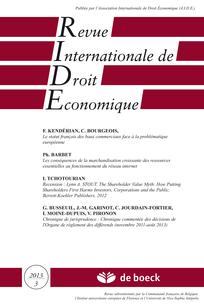Normes d’encadrement | Page 13
Normes d'encadrement Nouvelles diverses
Paris : la finance verte comme priorité
Ivan Tchotourian 27 juin 2016
Selon un article de L’Agefi.fr du 31 mai 2016, « Paris veut être en pointe sur les fintechs et la finance verte ».
Le Comité Place de Paris 2020, créé en 2014 à Bercy pour favoriser la compétitivité de la Place et le financement de l’économie, veut ainsi faire de Paris la référence de la zone euro pour les financements de marché des entreprises et pour la «finance intelligente» (smart finance). Celle-ci désigne la finance verte, les investissements socialement responsables ou encore les financements de projets d’infrastructures.
Sur ce point, je rappellerai simplement que Paris Europlace va effectivement de l’avant dans le domaine de la RSE et de l’ISR. Je vous renvoie sur ce point à un article publié sur le blogue Contact de l’Université Laval intitulé : « Entreprises responsables: Paris Europlace est prêt! ».
Voici une bien intéressante publication touchant la responsabilité sociétale des entreprises (RSE) et l’investissement socialement responsable (ISR) qui a été diffusée par la place financière de Paris (Paris Europlace) au cours de l’hiver 2015. Cette publication est le résultat d’une enquête dirigée par la commission Finance durable de Paris Europlace. Elle démontre que la RSE et l’ISR sont de moins en moins une utopie… même dans la sphère financière!
À la prochaine…
Ivan Tchotourian
Gouvernance normes de droit Structures juridiques
“Enterprise” and Lawyer’s view: By by Irresponsibility and Welcome in a New Area (à télécharger)
Ivan Tchotourian 25 juin 2016
Alors que le colloque du SASE va bientôt avoir lieu à Berkeley aux Etats-Unis, je reviens aujourd’hui sur ce que j’avais présenté au colloque qui s’était tenu en 2014 à Chicago : “Enterprise” and Lawyer’s view: By by Irresponsibility and Welcome in a New Area ».
Accédez au diaporama : PPT SASE 2014 version anglaise
Voici le résumé de cette intervention :
As institutions corporations and enterprises are the basis of capitalism and the subject of great interest for legal studies. Beyond regulation, the inherent nature of corporations raises sensitive legal questions, indeed, since its first appearance in the 18th century. Inspired by economic and financial sciences, legal theories incorporate corporations to contracts (referred to as “aggregate theory”), a private government (referred to as “artificial theory”) and an autonomous entity (“entity theory” or “doctrine de l’entreprise” in Continental Europe). It is indeed argued that incorporating corporations to a simple nexus of contracts has been the subject of great attention since the 1970s, provided that none of the above theories have definitely won unanimity in law, as seen by a comparative reading of the Canadian, American and European jurisprudence. Corporate governance rules clearly demonstrate such incorporation. In its essence, however, the contractual analysis regards the corporation as a means to serving private interests whereby the liability schemes are limited to protecting the supplier of capital. The contractual analysis’s vision is indeed restricted, and it summarizes its goals, to the sought-after maximization of the corporation’s shareholders value. At the heart of the corporation’s issues lies the financial aspect. Within this framework, non-financial concerns appear far away and are dealt with as simple externality that poses management problems. Nonetheless, the corporation’s activities are bearing an economic power that is today seen as ever increasingly significant and its financial and non-financial consequences should be the basis of further thinking. Yet, Canadian law has engaged into this pathway. On the one hand, Canadian corporate law has experienced a profound re-assessment through the Supreme Court of Canada’s decisions in Peoples (2004) and BCE (2008). Far from being a strict contractual reading of the corporation, these decisions have shed light on the importance of different paradigms such as corporate social responsibility and the stakeholders’ theory. Indeed, new incorporated corporate concepts have reshaped the way the corporation is perceived and its relationship with the environment. On the other hand, Canadian competition law attempts at integrating social concerns into its political sphere. In 2013, the Supreme Court of Canada has allowed the commencement of proceedings by indirect purchasers by way of a class action (see cases of Pros-sys, Sun-Rype and Infineon). Case law contemplates limiting the negative impact of anti-competition practices implemented by multinational corporations. The objective is to reinstate an economic balance as between corporations and its clients. The consumer is indeed called upon to play a protective role in the market in addition to the Canadian Competition authority’s competence. As affirmed by the Canadian Competition Tribunal in the decision of Visa/Master Card certain competition disputes between merchants are of common interest. Thus, the public should be made aware of the difficulties met by the businesses in the market. In light of the recent Canadian case law standpoint, it most certainly raises questions about the role that competition policies play within the corporation’s economic activities framework. This paper suggests showing the current legal positions of Canadian corporations and its competition law framework, in addition to putting them into perspective with their US and European counterparts. In addition to demonstrating their convergence in favor of a more social concern, we stand for the proposition that corporations, as has been defined by the jurist, does not only form a contract. Indeed, it is an institution that carries responsibilities as against its own environment.
À la prochaine…
Ivan Tchotourian
normes de droit responsabilisation à l'échelle internationale
Le Bangladesh ou l’immobilisme
Ivan Tchotourian 4 juin 2016
Comme l’indique un récent article de TheTyee.ca de David Ball, les choses ont peu bougé en matière de RSE au Bangladesh malgré l’affaire du Raza Plana : « Bangladesh Factory Safety Fixes ‘Far Behind Schedule’: Investors ». « Garment factory collapse killed 1,134 workers. But some warn progress is too slow » mentionne le journaliste. Face à cette situation, les investisseurs d’alarment.
Morceau choisi :
On Thursday, a letter signed by 140 organizations hoping to leverage their investment portfolios to improve conditions warned that despite some progress made since the disaster in setting safety standards, inspecting facilities, and signing accords, efforts to actually fix unsafe Bangladeshi factories have been too slow.
« While expert inspections have identified thousands of issues, the vast majority of corrective action plans are far behind schedule, » the letter states. « The lack of significant progress in addressing persistent systemic issues [will] continue to not only put workers at risk, but also pose material, financial and reputational risk for companies and their investors. »
One of the letter’s signatories was the Shareholder Association for Research & Education (SHARE), an organization that represents large institutional investors such as unions, pension plans and churches.
À la prochaine…
Ivan Tchotourian
autres publications Normes d'encadrement objectifs de l'entreprise Valeur actionnariale vs. sociétale
La valeur actionnariale au rancart !
Ivan Tchotourian 31 mai 2016
Belle tribune de la professeure Lynn A Stout : « The Myth of Maximizing Shareholder Value » (OpenEdNew, 23 mai 2016).
By the end of the 20th century, a broad consensus had emerged in the Anglo-American business world that corporations should be governed according to the philosophy often called shareholder primacy. Shareholder primacy theory taught that corporations were owned by their shareholders; that directors and executives should do what the company’s owners/shareholders wanted them to do; and that what shareholders generally wanted managers to do was to maximize « shareholder value, » measured by share price. Today this consensus is crumbling. As just one example, in the past year no fewer than three prominent New York Times columnists have published articles questioning shareholder value thinking. Shareholder primacy theory is suffering a crisis of confidence. This is happening in large part because it is becoming clear that shareholder value thinking doesn’t seem to work, even for most shareholders.
Je vous laisse lire la suite…
Pour rappel, j’avais eu l’occasion de faire une recension du très bel ouvrage de Lynn A Stout dans la Revue international de droit économique – 2013/3 ((t. XXVII)) – : ici.
Lynn A. STOUT, The Shareholder Value Myth: How Putting Shareholders First Harms Investors, Corporations and the Public, Berrett-Koehler Publishers, 2012
1 – Un sujet d’une grande actualité
2 – Remise en cause de la norme de primauté actionnariale
3 – Les actionnaires d’aujourd’hui
4 – Mise en perspective de l’ouvrage
À la prochaine…
Ivan Tchotourian
autres publications normes de marché
En savoir plus sur l’ISR ?
Ivan Tchotourian 25 mai 2016
Bonjour à toutes et à tous, si la problématique si actuelle de l’investissement socialement responsable (ISR) vous intéresse, nul doute que ce bel ouvrage suscitera votre curiosité : « The Routledge Handbook of Responsible Investment » (T. Hebb, J. P. Hawley, A. G.F. HOEPNER, A. L. Neher et D. Wood) chez Routledge.
The UN-supported Principles for Responsible Investment initiative has led to around a third of the world’s financial assets being managed with a commitment to invest in a way that considers environmental, social or governance (ESG) criteria. The responsible investment trend has increased dramatically since the global financial crisis, yet understanding of this field remains at an early stage.
This handbook provides an atlas of current practice in the field of responsible investment. With a large global team of expert contributors, the book explores the impact of responsible investment on key financial actors ranging from mainstream asset managers to religious organizations.
Offering students and researchers a comprehensive introduction to current scholarship and international structures in the expanding discipline of responsible investment, this handbook is vital reading across the fields of finance, economics and accounting.
À la prochaine…
Ivan Tchotourian
normes de droit responsabilisation à l'échelle internationale
Publication du fondateur : RSE et entreprises minières canadiennes – de récentes avancées
Ivan Tchotourian 15 mai 2016
Bonjour à toutes et à tous, je vous place sur le blogue un de mes derniers travaux de recherche intitulé ; « Human Rights and Mining Corporations: Canadian New Perspectives Regarding Corporation Social Responsibility ».
La responsabilité sociétale des entreprises gagne du terrain au Canada comme le démontre le sujet des entreprises multinationales notamment celles œuvrant dans le domaine extractif. Le Canada a adopté en novembre 2014 une nouvelle stratégie de promotion de la responsabilité sociale des entreprises pour les sociétés extractives canadiennes présentes à l’étranger. Si le cadre législatif se montre à l’heure actuelle peu contraignant, il n’en demeure pas moins qu’il a connu quelques réformes récentes cherchant en bout de ligne à donner à la RSE une place plus importante dans la sphère économique. Dans le même sens, la jurisprudence canadienne semble également faire bouger ses lignes en cherchant à imposer aux sociétés mères une responsabilité plus grande, tout en facilitant l’accès des victimes aux recours judiciaires. Au final, le droit canadien des affaires est dans un continuum réglementaire caractérisé par une série d’évolutions (d’une force normative variable) renforçant la responsabilité de ces dernières.
Pour accéder à ce papier en un clic :
Ce papier a été placé sur SSRN au lien suivant : http://papers.ssrn.com/sol3/papers.cfm?abstract_id=2773769.
À la prochaine…
Ivan Tchotourian
Gouvernance Normes d'encadrement
RSE : à la recherche de la bonne recette
Ivan Tchotourian 5 mai 2016
Très intéressant article dans le dernier journal Les affaires (30 avril 2016) qui touche la responsabilité sociétale et la gouvernance des entreprises (ici).
Si le terme de responsabilité sociale d’entreprise (RSE) regroupe des enjeux aussi variés que l’éthique, la gouvernance, les retombées économiques locales et les droits de la personne, c’est surtout de développement durable qu’on a discuté lors de la conférence…
À la prochaine…
Ivan Tchotourian



